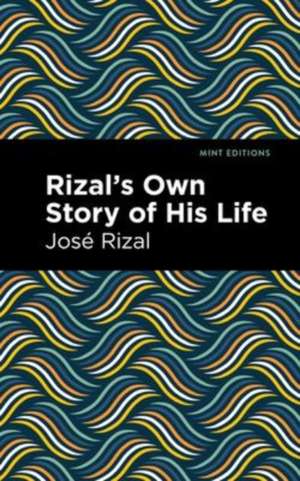Rizal's Own Story of His Life: Mint Editions (In Their Own Words: Biographical and Autobiographical Narratives)
Autor Jose Rizalen Limba Engleză Paperback – 16 oct 2025
Preț: 34.00 lei
Nou
Puncte Express: 51
Preț estimativ în valută:
6.51€ • 7.07$ • 5.47£
6.51€ • 7.07$ • 5.47£
Carte nepublicată încă
Doresc să fiu notificat când acest titlu va fi disponibil:
Se trimite...
Preluare comenzi: 021 569.72.76
Specificații
ISBN-13: 9781513128900
ISBN-10: 1513128906
Pagini: 100
Dimensiuni: 127 x 203 mm
Editura: West Margin Press
Seria Mint Editions (In Their Own Words: Biographical and Autobiographical Narratives)
ISBN-10: 1513128906
Pagini: 100
Dimensiuni: 127 x 203 mm
Editura: West Margin Press
Seria Mint Editions (In Their Own Words: Biographical and Autobiographical Narratives)
Notă biografică
José Rizal (1861-1896) was a Filipino poet, novelist, sculptor, painter, and national hero. Born in Calamba, Rizal was raised in a mestizo family of eleven children who lived and worked on a farm owned by Dominican friars. As a boy, he excelled in school and won several poetry contests. At the University of Santo Tomas, he studied philosophy and law before devoting himself to ophthalmology upon hearing of his mother's blindness. In 1882, he traveled to Madrid to study medicine before moving to Germany, where he gave lectures on Tagalog. In Heidelberg, while working with pioneering ophthalmologist Otto Becker, Rizal finished writing his novel Touch Me Not (1887). Now considered a national epic alongside its sequel The Reign of Greed(1891), Touch Me Not is a semi-autobiographical novel that critiques the actions of the Catholic Church and Spanish Empire in his native Philippines. In 1892, he returned to Manila and founded La Liga Filipina, a secret organization dedicated to social reform. Later that year, he was deported to Zamboanga province, where he built a school, hospital, and water supply system. During this time, the Katipunan, a movement for liberation from Spanish rule, began to take shape in Manila, eventually resulting in the Philippine Revolution in 1896. For his writing against colonialism and association with active members of Katipunan, Rizal was arrested while traveling to Cuba via Spain. On December 30, 1896, he was executed by firing squad on the outskirts of Manila and buried in an unmarked grave.
